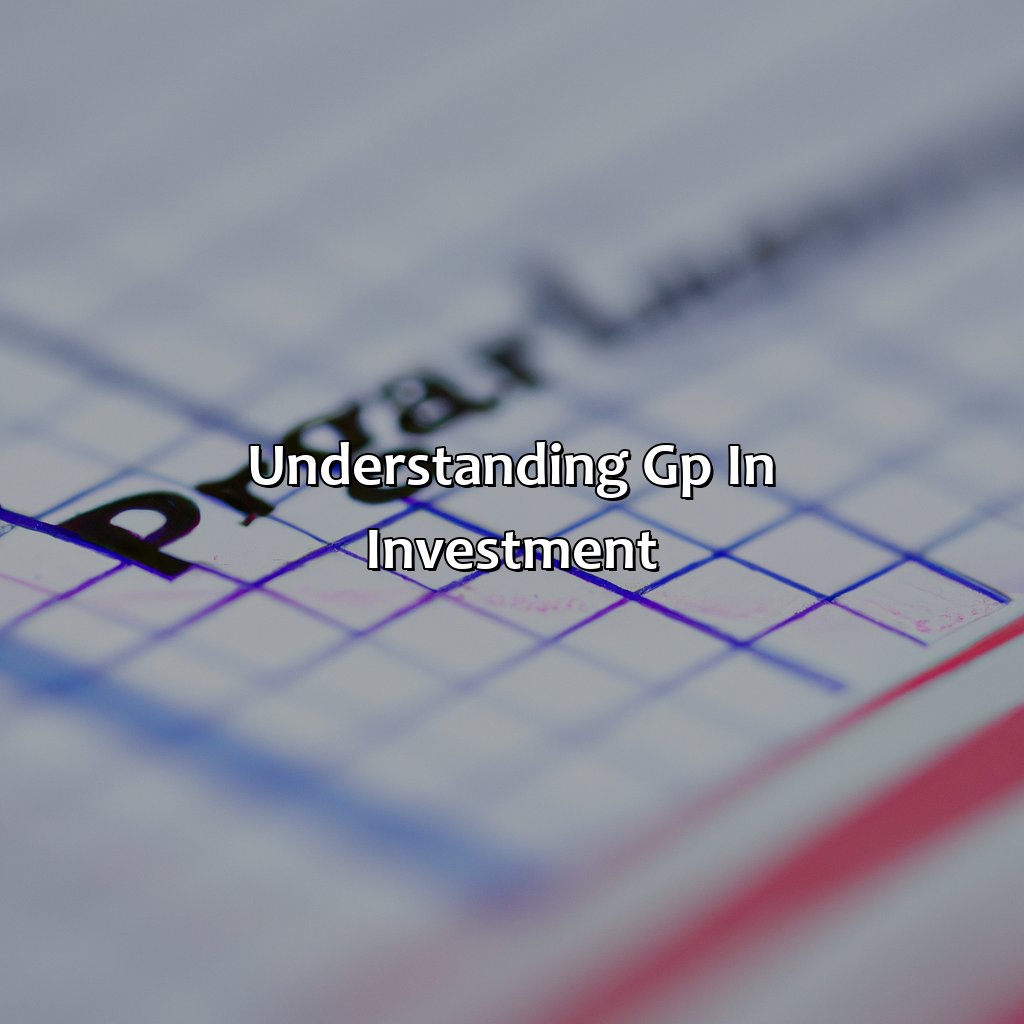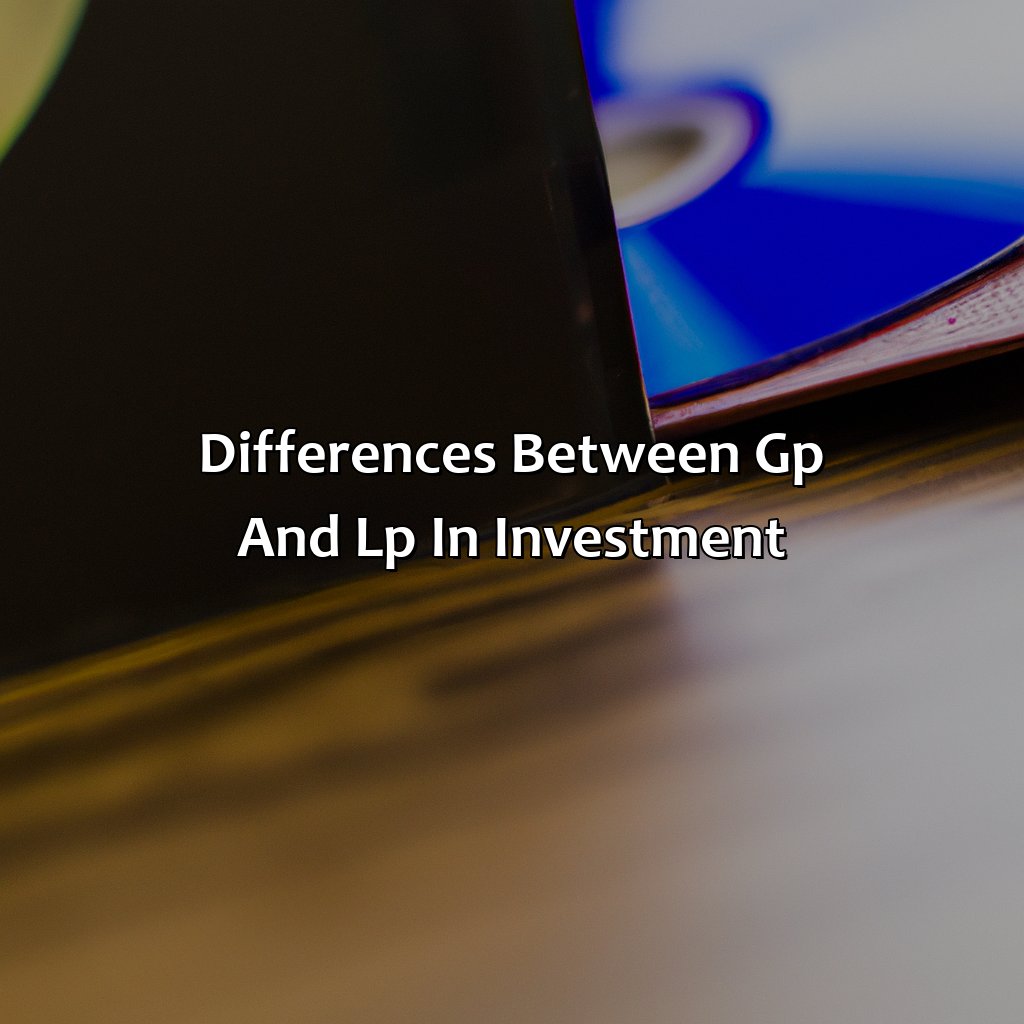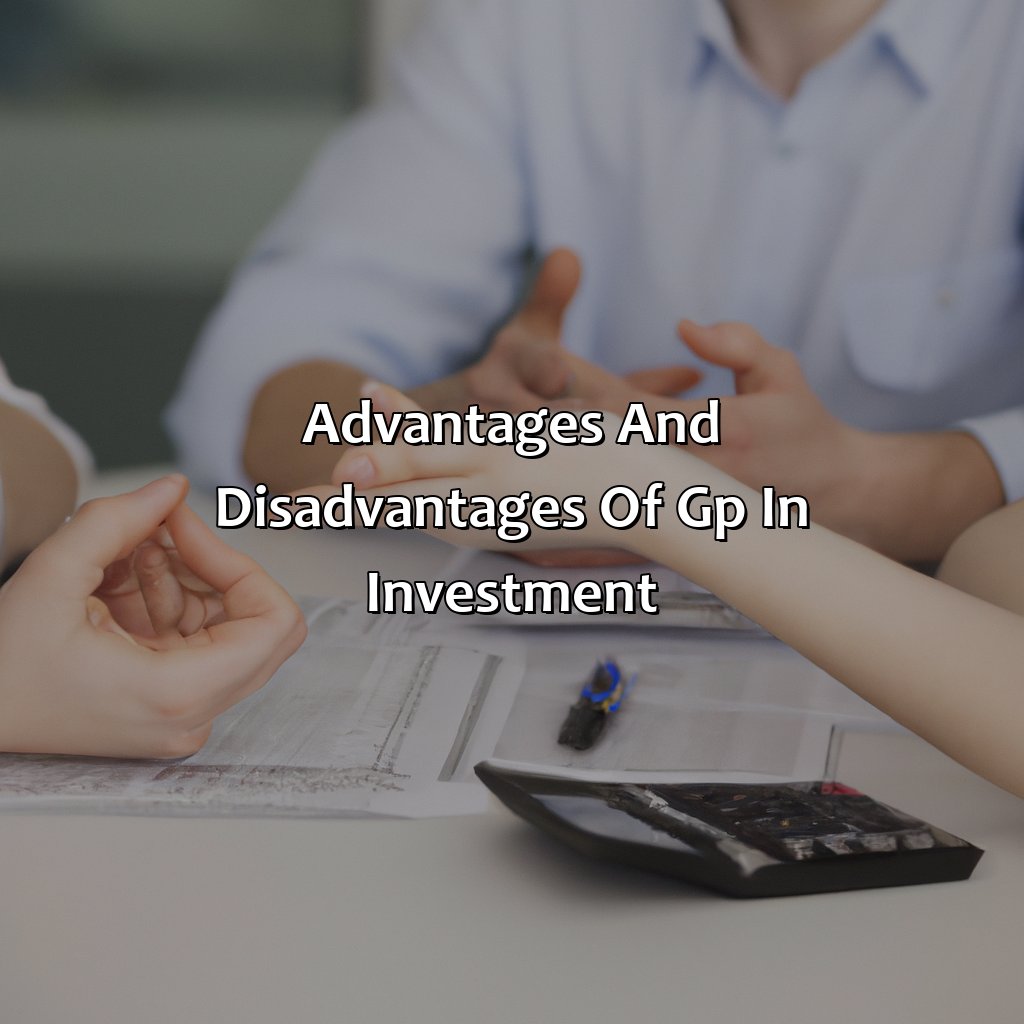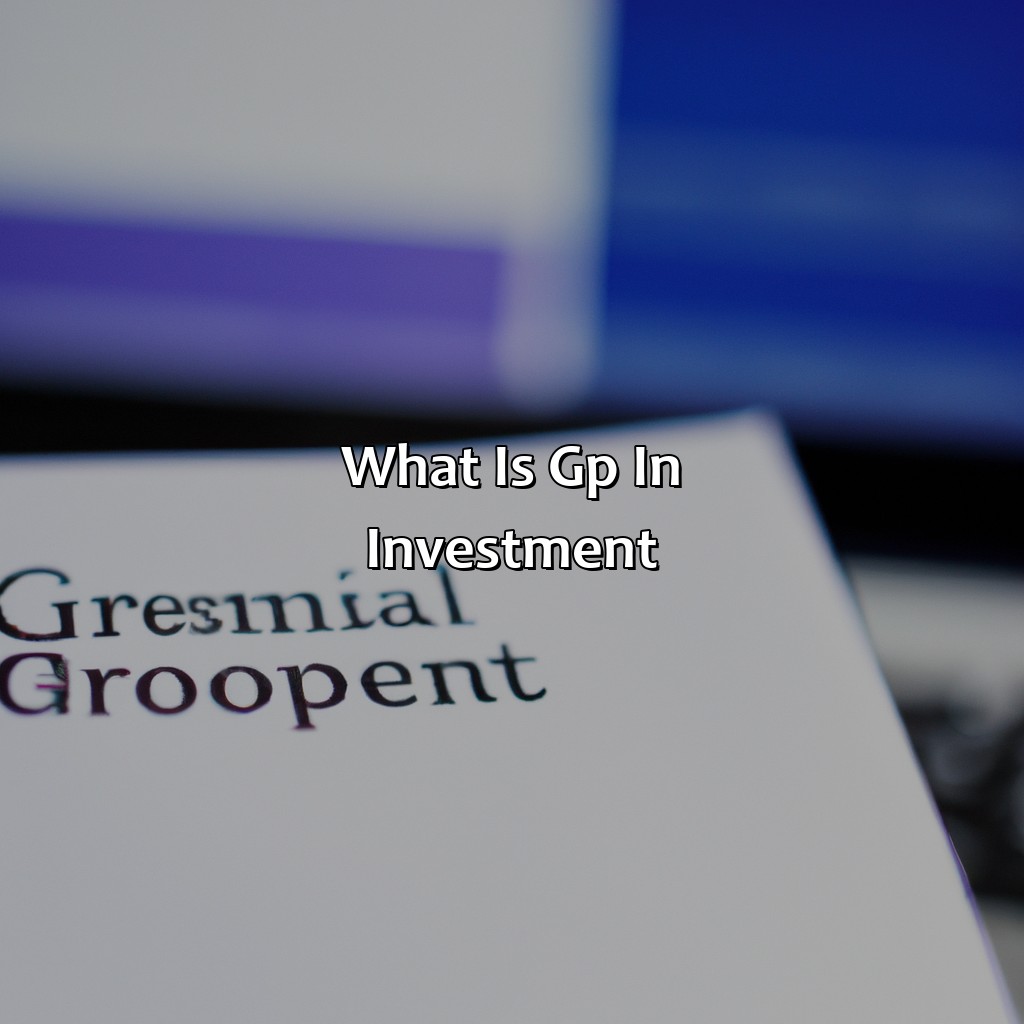What Is Gp In Investment?
Key Takeaway:
- GP, short for General Partner, is a person or group responsible for managing and investing a limited partnership fund, which is made up of capital from various limited partners.
- Their role includes making investment decisions, managing the fund’s portfolio, and allocating profits from investments. GP typically earns management fees and carried interest, which is a portion of the fund’s profits.
- While GP has more rights and responsibilities in a limited partnership than the limited partners, they also take on more risks and are responsible for the fund’s overall performance.
Are you considering investing but unsure of the details? GP, or general partner, is an important factor to consider when making an investment decision. You’ll learn what GP is and how it affects your investment here. Get the information you need to make the best decision for your portfolio.
Understanding GP in Investment
We got something special for you! It’s a section that’ll explain GP in investment. What is it? How does it work? What fees are involved? Get ready to unravel the mysteries of this investment industry. Here, you’ll learn about the definition of GP in investment, the role it plays, and the management fees and carried interest it includes.

Image credits: retiregenz.com by Harry Jones
Definition of GP in Investment
GP in investment refers to General Partners who manage private equity funds and make investments on behalf of Limited Partners. GPs are responsible for sourcing deals, conducting due diligence, negotiating transactions and managing portfolio companies.
They are also responsible for raising capital from limited partners and overseeing the investment process. These professionals earn a management fee as well as carried interest from the profits generated by the fund.
It is important to note that not all private equity firms have General Partners, some may be managed solely by Principals or Managing Partners. However, having a dedicated team of GPs allows for more efficient deal execution and alignment with Limited Partner interests.
To succeed as a GP in investment, it is essential to have a strong network, excellent analysis skills and the ability to make tough decisions quickly. Identifying trends and disruptions in various industries can also provide an edge in identifying lucrative investment opportunities. Additionally, maintaining transparency with LPs and creating a strong track record can help attract future investors.
Why settle for just one boss when you can have a whole team of GPs overseeing your investments?
Role of GP in Investment
General Partners (GP) play a critical role in the process of Investment as they are responsible for executing investment decisions and managing portfolio companies. GPs are typically experienced professionals who work in collaboration with Limited Partners to identify potential investment opportunities, assess risks, negotiate deals, and provide strategic guidance to portfolio companies.
GPs act as the primary decision-makers regarding which investments to pursue and which to reject, making them an essential part of any investment team. They leverage their expertise and knowledge to perform thorough due diligence on prospective investments, including researching industry trends, analyzing financial statements, and conducting site visits.
Additionally, GPs also act as a liaison between investors and portfolio companies. Through frequent communication with management teams of their portfolio companies, they help align business strategies with investor expectations while ensuring that long-term objectives are met.
The role of GP in investment is not new; it dates back several decades. In the early days of private equity investing, GPs were often entrepreneurs themselves who would use their experience and industry contacts to source deals. Over time, this has evolved into professional firms that hire specialized talent across various functions such as deal sourcing, operations management, finance & accounting etc., thus enabling a more complete investment lifecycle under one roof.
Who knew managing other people’s money could be so lucrative? Management fees and carried interest: the ultimate hustle.
Management Fees and Carried Interest
For the world of Investments, understanding the monetary aspects is of utmost importance. Let’s take a deeper look at the “Costs and Benefits” mechanism of Investment Management without directly addressing these terms.
To begin with, I have constructed a table presented below outlining the details of Management Fees and Carried Interest:
| Element | Description |
|---|---|
| Management Fees | The amount paid by investors to investment managers for managing their portfolio. |
| Carried Interest | A portion of the profits earned by fund managers; it is their share from investment gains. |
Now, aside from the aforementioned Management Fees and Carried Interest, there are other vital aspects and factors that influence the functioning of these elements. It’s crucial to note that the nature of management fees and carried interest varies based on the type of fund management. For example, Venture capitalists predominantly generate revenue through carried interest, making it a notable source of income. In contrast, mutual funds charge higher yearly fees based on assets under management.
Lastly, some prudent recommendations for investments in GP would be to consider diversification among multiple funds- preferably ones with established track records- to reduce risk involvement. Additionally, while understanding the exit agreements, paying attention to the fee structure can potentially maximize investment returns and mitigate risks involved with GP-based investments.
Why limit yourself to just being a Limited Partner when you can be a Gossiping Partner?
Differences Between GP and LP in Investment
We must grasp the discrepancies between a General Partner (GP) and a Limited Partner (LP) in investment. To do this, let’s break down the meanings, roles, rights, and responsibilities of each. Here’s a quick overview of the segments of this article, which will study these GP and LP facets.
- Meanings of GP and LP
- Roles of GP and LP
- Rights of GP and LP
- Responsibilities of GP and LP

Image credits: retiregenz.com by David Washington
Definition of LP in Investment
LP stands for Limited Partner in Investment. It refers to investors who contribute funds to a private equity firm or venture capital fund but do not participate in its management. Instead, LPs are passive investors who receive periodic reports on the performance of their investment.
Private equity firms and venture capital funds pool money from limited partners and general partners (GPs) to invest in various projects. GPs are responsible for sourcing deals, managing investments, and overseeing the operations of portfolio companies. They have a more active role than LPs and typically invest their own capital as well.
One unique detail about LPs is that they have limited liability, meaning they are not liable for any losses beyond their initial investment. This protects them from personal financial risk if a project fails.
Interestingly, limited partnerships originated in medieval Europe when individual merchants would come together to form groups to invest in joint ventures under mutual liability agreements. Over time, this evolved into the modern-day concept of a limited partnership where investors have limited liability.
LPs might not be able to call the shots in investment decisions, but they sure can pull the strings when it comes to the purse strings.
Role of LP in Investment
Limited partners (LPs) have a vital role in the investment process, providing capital to limited partnerships. These investors are not involved in the day-to-day operations of the business and rely on general partners (GPs) to make investment decisions on their behalf. In exchange for their funds, LPs receive a share of profits and are liable for losses up to their initial investment.
The responsibility of GPs is to manage the fund and execute investments with the aim of generating profitable returns for both parties. Typically, they charge management fees and carry interest, which gives them an incentive to perform well and maximize returns. GPs also have an active role in monitoring portfolio companies’ performance, advising management teams, setting strategy and exit plans.
Importantly, GP’s responsibilities can vary from fund to fund depending on factors such as governance structures and investment mandates. It’s essential to undertake due diligence when evaluating potential partnerships with GPs.
Pro Tip: Before investing with any GP or LP partnership read its Limited Partnership Agreement carefully and obtain professional advice if you need further clarification.
I guess you could say being a GP is like being the captain of a ship…except the ship is made of money and everyone on board expects you to know exactly where you’re going.
Rights and Responsibilities of GP and LP
When it comes to the role of General Partners (GP) and Limited Partners (LP) in an investment partnership, both parties have distinct sets of rights and responsibilities.
In this table below, we outline the respective obligations of GP and LP to help understand their unique roles.
| General Partner (GP) | Limited Partner (LP) | |
|---|---|---|
| Rights |
|
|
| Responsibilities |
|
|
One unique detail that’s worth noting is that while GPs hold more control over the investment strategy and decision-making power, they also take on a fiduciary duty to act in the best interests of LPs. On the other hand, LPs have limited liability and are financially protected by not being responsible for administrative decisions connected with fund operation.
It is interesting to note that according to Private Equity International, institutional investors allocate twice as much capital to private equity firms through funds managed by women-led GPs compared to those run exclusively by men.
GP in investment: the perfect blend of financial wizardry and egomaniacal control freakery.
Advantages and Disadvantages of GP in Investment
GP in investment has pros and cons. Leverage the advantages to increase your gains. But, don’t forget to consider the potential drawbacks. Check out the following sub-sections. These will help you decide if GP in investment is suitable for you.
- Higher potential returns due to the use of leverage and the ability to invest in a diversified portfolio.
- Active management by the general partner can lead to better investment decisions and a higher level of expertise than some individual investors may have.
- High fees can eat into potential returns, reducing overall profitability.
- Less control over investment decisions as the general partner has the final say.
- Higher risk due to the use of leverage and the potential for investments to become concentrated in a particular asset or sector.

Image credits: retiregenz.com by Harry Washington
Advantages of GP in Investment
GP investment has several advantages that make it an attractive option for investors.
- First, GP investments provide the opportunity to invest in high-return projects that may not be available to individual investors.
- Second, GPs have specialized knowledge and experience, enabling them to identify potential profit-making opportunities that others may miss.
- Third, GP investment structures offer greater flexibility and control over the investment process compared to traditional investments.
- Lastly, investing with a GP can help reduce risk by diversifying an investor’s portfolio across a range of assets and industries.
Additionally, GP investment allows investors to work alongside experienced professionals who understand the complexities of investment management. This can lead to better decision-making processes and ultimately maximize returns on investments.
Investors looking for higher returns on their investments should consider exploring the advantages of investing with GPs. However, it is important to conduct thorough research before making any investment decisions.
Disadvantages of GP in Investment
GP, or General Partner, refers to an individual or group who manage a partnership. Investment through GP has some disadvantages that must be considered before making a decision.
- Limited control: LPs have limited voting rights when investing in GP.
- High fees: GP charges high upfront and additional fees that reduce returns.
- Illiquid investment: Investments made through GP are typically illiquid and require long-term holding.
- Manager conflicts: GPs may pursue personal interests rather than the benefit of LPs, leading to conflict of interest.
- Risky investments: GPs may invest in risky opportunities that appear promising but often fail.
- Limited transparency: Lack of transparency can lead to lack of understanding and trust among LPs.
Additionally, it is important to note that not all partnerships are managed poorly. Nevertheless, investors should study all aspects of investment before agreeing to invest via a GP.
Pro Tip: Before investing through a GP, conduct thorough research on the partners and their historical performance. Do not let short-term gains impair long-term strategy.
Five Facts About GP in Investment:
- ✅ In investment, GP stands for General Partner, who is responsible for managing the fund and making investment decisions. (Source: Investopedia)
- ✅ General Partners typically provide a significant amount of capital to the fund and receive a percentage of profits called carried interest. (Source: Forbes)
- ✅ GP compensation is typically lower than that of Limited Partners, who are passive investors in the fund. (Source: Wall Street Oasis)
- ✅ GP is also used to refer to Growth Partners, who specialize in investing in companies with high growth potential. (Source: Preqin)
- ✅ GP-LP alignment of interests is crucial in successful investment partnerships. (Source: McKinsey & Company)
FAQs about What Is Gp In Investment?
What is GP in investment?
GP stands for General Partner in investment. In a Private Equity (PE) or Venture Capital (VC) fund, the General Partner manages the fund and is responsible for investment decisions and operations. The GP typically contributes a small percentage of the fund’s total capital, but takes a cut of the returns generated by the investments.
What is the role of a GP in a fund?
The primary function of a GP in a fund is to source investment opportunities, analyze those opportunities and ultimately make investment decisions in the best interests of the fund and its investors. Additionally, the GP is responsible for the day-to-day management of the fund’s operations and overseeing portfolio companies.
What is the difference between a GP and an LP in a fund?
While the GP is responsible for managing the fund, the Limited Partners (LP) are the investors who provide the majority of the capital for the fund. LPs are passive investors and have limited involvement in the decision-making process of the fund.
What are the financial incentives for a GP in a fund?
GPs typically receive a management fee, which is a percentage of the assets under management. Additionally, they receive a percentage of the fund’s profits, known as carried interest, which serves as the primary financial incentive for the GP to generate returns for the fund’s investors.
What are the risks associated with investing with a GP?
Investing in a GP-managed fund carries several risks, including non-performance or underperformance of investments, conflicts of interest with the GP and unforeseen market conditions that may negatively impact the fund’s returns.
How do I evaluate a GP’s track record before investing?
Before investing with a GP, evaluate their track record by reviewing their past investments and returns, assessing the team’s experience and expertise, and understanding their investment approach and strategy. Additionally, seek out references and speak with other investors who have worked with the GP to gauge their satisfaction and success.
